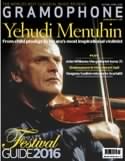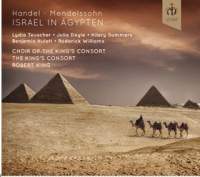Texte paru dans: / Appeared in: |
|
|
Outil de traduction (Très approximatif) |
|
|
Reviewer:
Richard Wigmore
‘In this oratorio Handel saved his successors trouble by writing his own additional accompaniments,’ noted Winton Dean in his classic Handel’s Dramatic Oratorios and Masques (OUP: 1959). Not that this deterred Mendelssohn when he mounted Israel in Egypt in Düsseldorf in 1833. With no available organ or harpsichord, he rescored the ‘dry’ recitatives for two cellos and double bass, adding a few linking recitatives of his own. The grandly scored choruses acquired extra woodwind and horns, while a pair of clarinets infiltrated the arias and duets. Mendelssohn’s reverence for Handel, and his innate fastidiousness, ensured that it was all done with taste and discretion – arguably more so than in Mozart’s version of Messiah. Beyond his rescorings, Mendelssohn jettisoned four choruses (most regrettably the splendidly lugubrious ‘He loathed to drink of the river’) and the bass duet ‘The Lord is a man of war’, and reallocated a couple of the arias to different voices. Mendelssohn’s 1833 performing score of Israel in Ägypten, as it became, has survived only in fragments, most of them in the Bodleian Library in Oxford. For performances in the 2014 Leipzig Mendelssohn Festival, and this new recording, Robert King has skilfully reconstructed Mendelsson’s own reconstruction, abetted by a crack 36-strong British choir and a cosmopolitan ‘period’ orchestra using early-19th-century principles and techniques. In the absence of a Handelian overture, Mendelssohn revised his own early Trumpet Overture, in which intimations of The Hebrides and A Midsummer Night’s Dream jostle with bouts of neo-Handelian counterpoint. If it makes a rather too jolly prelude to the cries of the suffering Israelites, the overture is an exuberantly inventive piece, played here with terrific verve and clarity of texture. With his vast Handelian experience, King ensures that Handel’s mighty series of choral frescoes emerge in all their brilliance and incisiveness, aided by a carefully judged choral-orchestral balance. The pastoral ‘Aber mit seinem Volke’ (aka ‘But as for his people’) here lacks an ideal airy lilt. But the singers and players respond with sadistic relish to the various plagues conjured up by Jehovah at his most repulsively rampant, using the hardness of the German consonants to heighten the cruelty of ‘Er schlug alle Erstgeburt’ (‘He smote all the first-born’). The choir finds the perfect shrouded tone for the Stygian ‘Er sandte dicke Finsternis’ (‘He sent a thick darkness’, where Mendelssohn’s lowpitched flutes and horns add an evocative new colour), and musters an impressive weight and depth of sonority for the terribilità of ‘Das hören die Völker’ (‘The people shall hear’).
Of the uniformly fine soloists, Roderick Williams has fun with the reallocated ‘frog’ aria, egged on by gleefully hopping violins and croaking clarinet. The pure-toned sopranos combine gracefully in the duet ‘Der Herr ist mein Heil’ (‘The Lord is my strength’), tenor Benjamin Hulett is a keen storyteller in his recitatives, and contralto Hilary Summers sings the assuaging
‘Bringe sie hinein’ (‘Thou shalt bring them in’) with mingled gravity and warmth. In sum, a vividly realised snapshot of a fascinating historical moment, its attractions enhanced by a lavishly produced booklet containing detailed notes by King and Mendelssohn scholar Larry Todd. |
|
|
|
|
|
Cliquez l'un ou l'autre
bouton pour découvrir bien d'autres critiques de CD |
|




